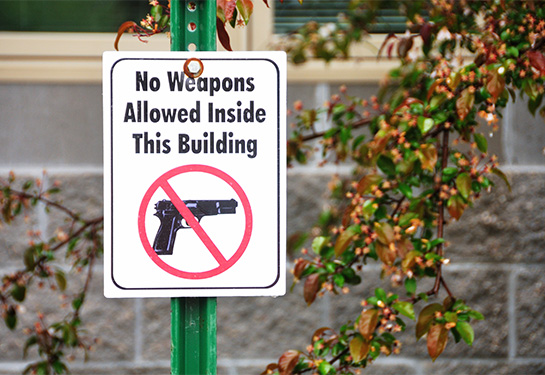Free course to help health care providers reduce gun violence
BulletPoints Project training shows how to identify at-risk patients and provides tools for talking about firearm safety
The BulletPoints Project at UC Davis Health has launched a free online continuing education course to help physicians and other health care providers reduce gun violence. Although it is geared for clinicians, anyone can sign up.
The training shows how to have conversations with patients who have access to firearms and may be at risk of interpersonal violence, suicide, or unintentional injury. It also teaches participants how to intervene according to the type and level of risk of firearm violence.
"Clinicians play an important role in shaping public perceptions about safety and injury prevention. The same way a health care provider might ask a patient about smoking cigarettes, or a pediatrician might ask about car seats, they can also talk to their patients about firearms in a non-partisan, non-judgmental way," said Amy Barnhorst, director of the BulletPoints Project, and vice chair for clinical services at the UC Davis Department of Psychiatry.
The course, Preventing Firearm Injury: What Clinicians Can Do, takes about an hour.
Health care providers who complete the course can receive one hour of Continuing Medical Education (CME) through the California Medical Association or Continuing Education (CE) credits through the American Psychological Association. To earn the CME or CE credit, participants must complete all activities, pass the final quiz by answering at least 70% of the questions correctly, and complete an unscored course evaluation.
The same way a health care provider might ask a patient about smoking cigarettes, or a pediatrician might ask about car seats, they can also talk to their patients about firearms in a non-partisan, non-judgmental way.—Amy Barnhorst
Course provides tools for preventing gun violence
The course features different scenarios where a patient may be at risk of firearm violence, including suicide, intimate partner violence, mass shootings and unintentional shootings. The clinicians are walked through these scenarios and learn about intervention resources. They also learn how to talk about the risks and interventions in culturally and politically neutral ways.
Some intervention options include safe gun storage, temporary transfer of firearms, civil protective orders (also known as “red flag laws” or gun violence restraining orders) and mental health holds, known as 5150.
The course uses a method known as the 3A’s Framework: Approach, Assess, Act.
Approach:
- Be informed
- Be respectful
- Focus on harm reduction
- Be individualized
Assess:
- Risk factors
- Ideation or threats
- Access to guns
- Willingness to collaborate
Act:
- Safe storage
- Temporary transfer of firearm
- Mental health hold
- Civil protective order
In 2020, the most recent year for which complete data is available, 45,222 people died from gun-related injuries in the U.S. That same year, 79% of all homicides and 53% of all suicides involved firearms. The firearm homicide rate in 2020 was the highest in over 25 years.
"The solution to our epidemic of gun violence is multifaceted and complex, and will take changes in policy, education, health care, school, and media," said Barnhorst. "Educating healthcare providers is an important piece of the puzzle."
For more information about the course and to sign up, visit Preventing Firearm Injury: What Clinicians Can Do.
About
The BulletPoints Project is funded by the State of California and developed by the California Firearm Violence Research Center at UC Davis Health.
The UC Davis Violence Prevention Research Program (VPRP) is a multi-disciplinary program of research and policy development focused on the causes, consequences and prevention of violence. Studies assess firearm violence, the social conditions that underlie violence, and the connections between violence, substance abuse and mental illness. VPRP is home to the University of California Firearm Violence Research Center, which launched in 2017 with a $5 million appropriation from the state of California to conduct leading-edge research on firearm violence and its prevention. For more information, visit health.ucdavis.edu/vprp/.





